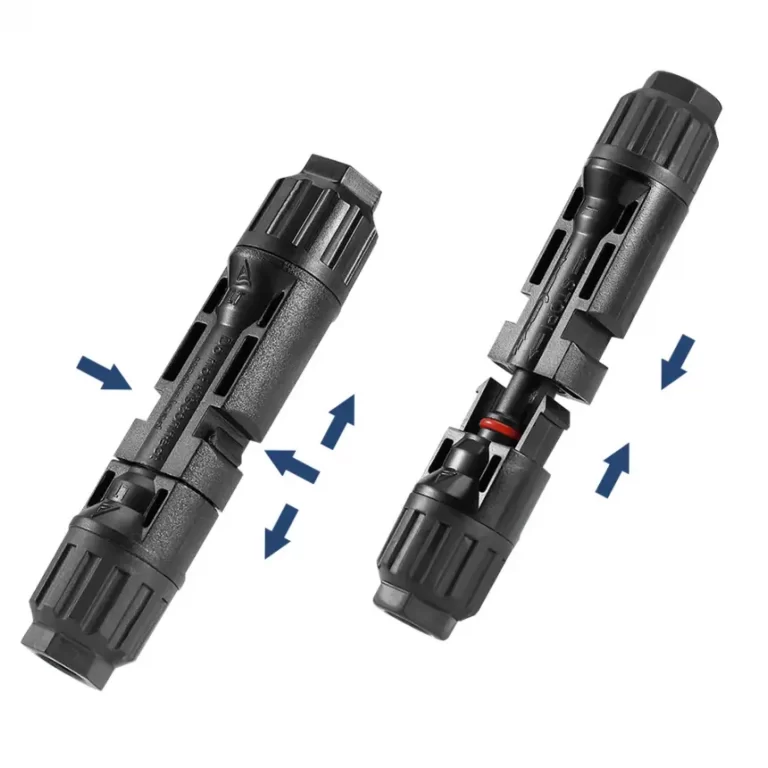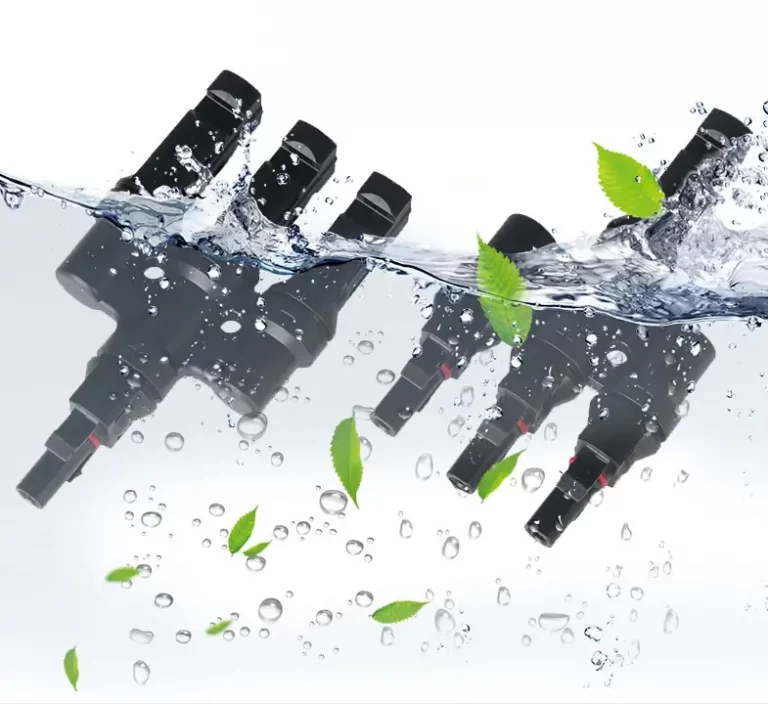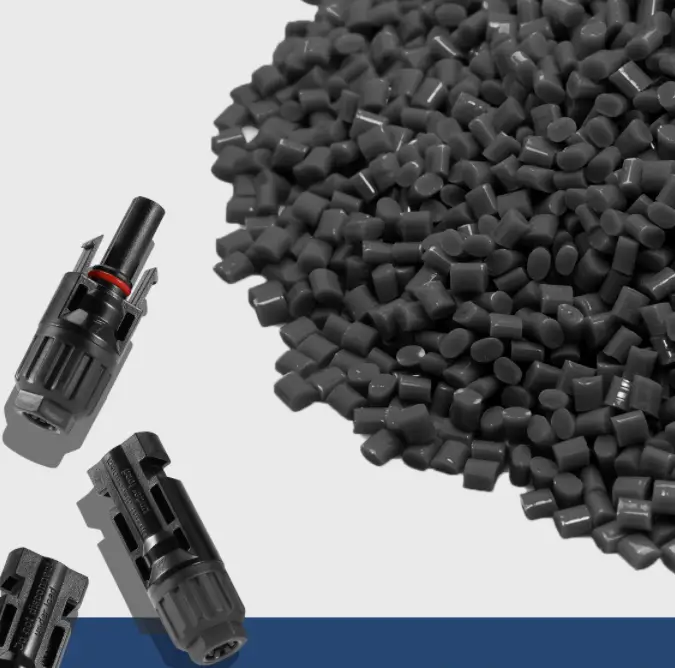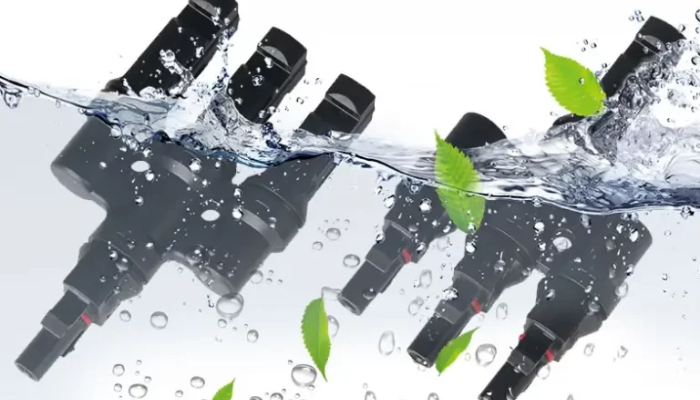Yes, MC4 solar connectors are IP67-rated waterproof. MC4 connectors are a standard type of connector commonly used for solar panel connections.
The solar industry relies heavily on MC4 connectors for their durability and performance in various environments. These connectors are designed for outdoor use and can withstand harsh conditions including heat, and UV exposure.
Today, we will take a deep look at the waterproof nature of MC4 connectors, explore their importance, and how to ensure that these connectors are used correctly in solar systems to optimize performance and durability.
MC4 Connector Design and Construction

MC4 connectors consist of multiple parts, including plugs and sockets, locking sleeves, and sealing rings. These parts work together to provide a safe and reliable electrical connection.
The body of the connector is usually made of UV-resistant and corrosion-resistant materials because they must be able to withstand harsh outdoor environments.
MC4 Connector IP67 Rating Waterproof Features
The IP67 rating stands for “Ingress Protection.” This rating specifies the level of protection against dust and water that the mc4 solar connector provides. The first digit, “6,” indicates complete protection against dust ingress.
The second digit, “7,” indicates immersion in 1 meter of water for up to 30 minutes. This high level of protection ensures that the mc4 solar connector remains reliable in harsh environments.
How the IP67 Rating Ensures Waterproof and Dustproof
The IP67 rating ensures that the mc4 solar connector can withstand the erosion of dust and water. The connector uses a high-strength waterproof ring made of insulating silicone. The ring prevents water and dust from entering the internal structure.
This design ensures that the mc4 solar connector can maintain its performance even in harsh conditions. This makes them ideal for outdoor installations that are inevitably exposed to the elements.
Factors Affecting MC4 Connector Waterproofing

The water resistance of MC4 connectors can be affected by a variety of factors. Understanding these factors can help maintain the integrity of the connection in harsh environmental conditions. The following are the main factors that affect the water-resistance of MC4 connectors:
Manufacturing Quality: High-quality connectors are more likely to maintain their watertight integrity over time than low-quality connectors.
Material Degradation: The plastic housings and rubber seals used in MC4 connectors can degrade due to exposure to UV rays, extreme temperatures, and chemicals.
Installation Practices: Improper installation of MC4 connectors can lead to a poor seal and ultimately water ingress.
Environmental Conditions: Exposure to extreme weather, such as heavy rain, high humidity, salt spray in coastal areas, and temperature fluctuations can also degrade the integrity of the watertight seal.
Aging and Wear: Over time, repeated connect and disconnect operations and the natural aging process can wear down connector components.
Dust and Dirt Accumulation: The accumulation of dust and dirt can prevent MC4 connectors from closing completely or sealing properly.
Improper Handling: Scratching or damaging connector surfaces or seals during installation or maintenance.
Tips for Extending the Waterproofing of MC4 Connectors
To extend the waterproofing of MC4 connectors, the following measures can be taken to ensure that the connectors maintain good waterproofing performance and reliability in the solar system for a long time:
Choose high-quality connectors: Choose high-quality MC4 connectors produced by well-known manufacturers. These connectors usually use high-quality materials, which can better resist the influence of environmental factors and ensure long-term waterproofing performance.
Proper installation: Make sure that the MC4 connectors are properly installed according to the manufacturer’s instructions. Proper installation includes ensuring that the connectors are fully inserted and locked to prevent moisture from penetrating.
Use special tools: Use special MC4 installation tools (such as MC4 pliers) to insert and tighten the connectors to ensure the tightness and consistency of the connection and avoid damage or poor sealing caused by improper manual installation.
Regular inspection and maintenance: Regularly inspect the appearance and function of MC4 connectors, looking for any cracks, damage, or signs of aging. Check the seals for integrity and ensure that there is no looseness or corrosion.
Protective measures: In extreme environmental conditions, consider using additional protective measures, such as waterproof tape or additional protective covers to provide an additional layer of protection for the connector.
Avoid mechanical stress: Avoid excessive stretching or twisting of the cable during installation, as this may cause the connector gap to increase and affect its waterproof performance. Ensure that the cable layout is reasonable to reduce stress caused by wind or movement.
Cleaning and maintenance: Keep the connector clean and remove dust and dirt regularly. This can be achieved by gently wiping the connector surface with a soft cloth and an appropriate detergent.
Environmental considerations: When designing and arranging a solar system, consider environmental factors such as temperature changes, humidity, and UV intensity, and choose a suitable installation location and protection measures.
Before installing and connecting MC4 connectors, please consider these factors to improve the waterproof performance of MC4 connectors, thereby extending their service life and ensuring the efficiency and reliability of solar energy systems.
Advantages of Using MC4 Solar Connectors

- High compatibility: MC4 connectors are standard in the solar industry and are suitable for most modern solar systems.
- Waterproof and dustproof: Meets IP67 standards to ensure stable operation in a variety of environments.
- Weather and UV resistance: Resists extreme climates and UV rays to ensure long-term outdoor use.
- Easy plug and unplug: Easy-to-operate plug and unplug design simplifies installation and maintenance.
- High safety: Equipped with a locking mechanism to prevent accidental disconnection and improve system safety.
- High electrical performance: Withstands high voltage and current, minimizes power loss and optimizes energy efficiency.
- High durability: Rugged structure for long-term outdoor use, reducing replacement frequency and cost.
- Cost-effectiveness: Although the initial cost is slightly higher, long-term reliability and low maintenance costs provide a good return on investment.
MOREDAY’s MC4 solar connectors are IP67-rated waterproof and dustproof. The connector uses high-quality materials such as copper and UV-resistant plastic to improve durability and provide reliable performance in various weather conditions. MOREDAY offers a range of MC4 connectors for different applications. Choose MOREDAY for reliable and efficient solar solutions.
FAQ
How do I Protect my MC4 Connector?
- Regular inspection: Check the connector regularly for damage, corrosion, or looseness, and replace damaged parts in time.
- Correct installation: Ensure that the connector is installed correctly, follow the manufacturer’s instructions, and use special tools for installation and removal.
- Avoid mechanical stress: Ensure that the cables are properly laid out to avoid excessive stretching or bending to reduce mechanical stress.
- Use protective sleeves: In extreme environments, protective sleeves or other protective measures can be used to additionally protect the connector.
- Cleaning and maintenance: Clean the connector regularly to remove dust and dirt to prevent accumulation and poor contact.
- Avoid direct exposure: Minimize direct exposure of the connector to sunlight and rain, and use sunshades or waterproof measures.
What are the types of MC4 connectors?
MC4 connectors are mainly used in solar photovoltaic systems. Although the basic types are relatively uniform, there are some variations depending on the installation requirements and configurations. Here are some common MC4 connector types:
- Standard MC4 connector: This is the most common type and is used to connect single-core solar cables.
- MC4 Y-type connector: This connector allows cables from multiple solar panels to be connected in parallel to the same cable, and is often used to expand system capacity.
- MC4 T-type connector: Similar to the Y-type, but with slightly different shapes and layouts for specific wiring needs.
- MC4 junction box connector: A junction box for solar panels, usually integrated on the back of the solar panel as part of the cable output.
Each type of MC4 connector is designed to meet different system requirements and configurations, ensuring the flexibility and scalability of solar photovoltaic systems.
Related reading: MC4 Connector Crimping Tools


